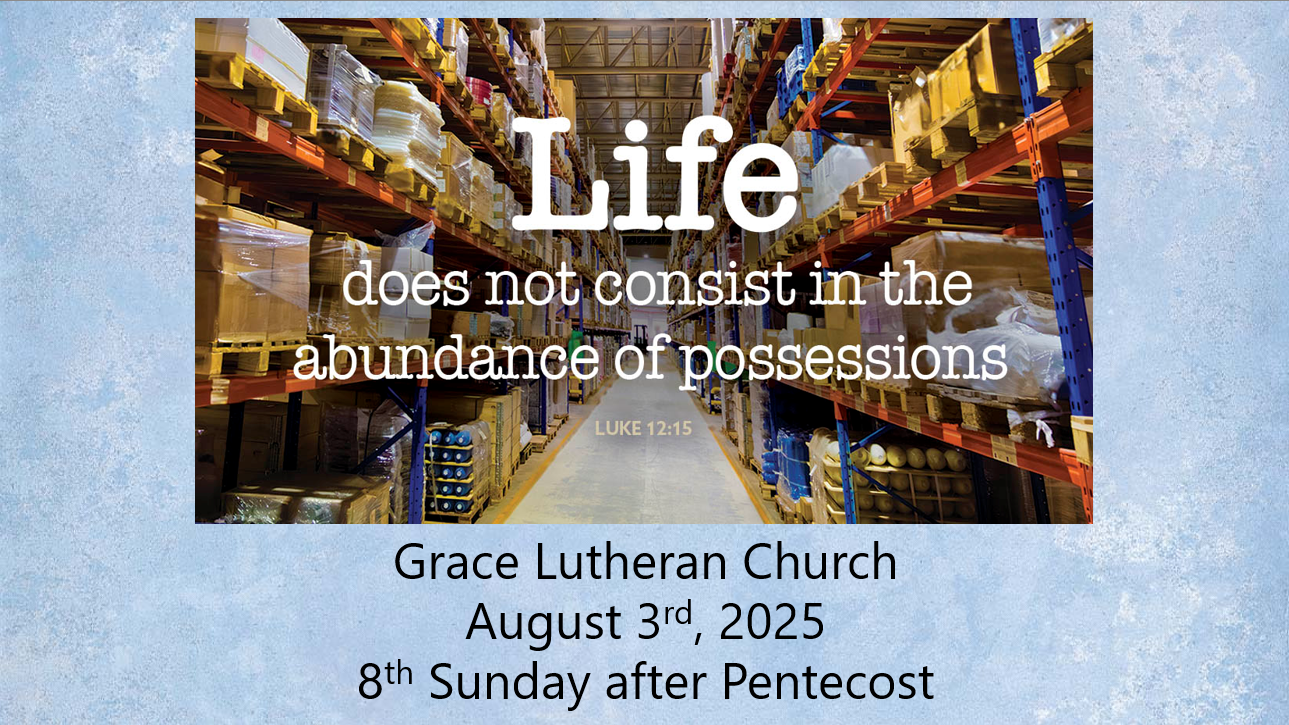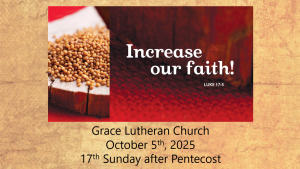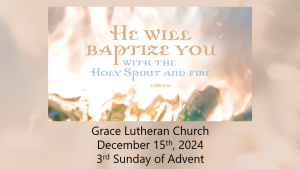Hi everyone,
Welcome to worship for this 8th Sunday after Pentecost, which lands on August 3, 2025!
The bulletin for this service can be found here. You can use it to follow along with the service or you can use the words on the screen. The sermon is also found in the bulletin as well as on this page under the video.
For an enhanced online worship experience, you may have a lit candle in your space that can be extinguished near the end of the service, after the sending hymn. You are also welcome to participate in communion if you are comfortable, by having something small to eat and drink prepared for consumption. Further instruction will be given at the appropriate time.
May God’s everlasting promises of justice and peace fill you with hope and joy, this day and always!
Holy God, by the power of your Spirit reveal to us the wisdom of your Word, your truth, and your love, through Jesus Christ. Amen.
“Do you really need it?”
That’s what a buddy of mine asked me as we were on the way to pick up some aftermarket parts for my relatively new car at the time. This was quite a while ago when I was just starting my obsession with cars. I was looking to modify my car to make it cooler than it already was, in hopes of enhancing its driving experience and performance. And I guess my buddy thought I was wasting time and money, and so he asked me if I really needed what I was planning on getting.
To be honest, it struck me as odd that he’d ask me this. Not because it was just as condescending as it sounded, not because the part I was thinking about getting really does nothing to the car’s overall driveability, and certainly not because I could barely afford the car itself let alone all the mods I wanted to do to it, but the question really stood out as strange because honestly this guy had way more stuff than I ever had. He comes from a pretty wealthy family so ever since I met him in high school he was never really without. He was used to getting anything he wanted, going anywhere he wanted, and pretty much doing anything he wanted (within the confines of the law, of course).
So for him to ask me this question just seemed to be out of character. It was like of all people to put me in my money-spending place, I didn’t think it’d be the one who had a lot more money to spend than the rest of us. I just thought that it was kind of weird that he’d have this perspective on this stuff that I wanted to buy, especially since he had much more than I did.
While he didn’t actually straight out tell me what I should or shouldn’t do, just him posing the question made me feel a little judged. It made me feel like I was being irresponsible, wasteful, and a little dumb. But as much as I hate to admit it, he wasn’t wrong. Like I said, I could barely afford this car with the money I was making at the time, so I really shouldn’t be thinking about buying extra stuff for it that didn’t really make it better in the long run.
That was a hard pill to swallow. I mean yeah, I wasn’t making a lot of money back then, but I was still making money. I had just moved out and I was finally able to support myself out from under my parents. I was “adulting” and learning to enter into my own independence and identity. So I bought a car.
So while my car didn’t really need these mods, but I needed to be able to express this new independence and identity. I needed to be able to spend my money the way I wanted to without being told otherwise. I needed to figure out this thing called life for myself.
So I guess I was confusing need with want. I was trying to fill this part of me with something that actually wouldn’t be filling it. I was trying to be something but I was reaching for the wrong things, hoping for the wrong things, and needing the wrong things.
Vanity, vanity, it’s all vanity. That’s what the author of Ecclesiastes, known as the Teacher, says in today’s first lesson. He says that we do what we do throughout life, working hard and toiling under the sun, but it is actually vanity because we’ll be dead before we could enjoy the fruits of our labours. All our work won’t mean anything because it will soon be forgotten. Who we are and what we’ve done will fade into history. It’s like there isn’t any point in hard work because it won’t amount to anything lasting anyway.
Then in the gospel lesson Jesus seems to call the rich man in his parable a fool for saving like several barn’s full worth of stuff when his life is being demanded of him almost the very second he decides that he has enough to retire. So not only is hard work pointless, but so is saving and planning for a future that we don’t even know we’ll have. It sounds like this rich guy in the parable also wasted his whole life in working hard, gathering, and amassing all he has.
It’s like these two stories answered my friend’s question from all those years ago. We don’t need all this stuff. We don’t need to work and save so hard. We don’t need to accomplish what we’re accomplishing.
Really, it seems like we’re taught to not bother, doesn’t it? It seems like these texts are telling us to be more carefree and worry less about our future. It seems like we are given permission and even encouraged to eat lavishly, drink irresponsibly, and be merry at any cost, for tomorrow we might find ourselves dead.
Live each day as it’s your last, right?
So go ahead, buy that car part. Splurge on that Lego set. Eat all the food set before you and then some. Don’t be offend by someone asking you if you really need all of that, because who knows? Tomorrow we might be dead and then all that money that we have saved will go to waste. And since our identity and who we are is tied to what we have, we might as do whatever makes us happy because it’s all fleeting and meaningless. That’s what we should do, right? That what the bible says?
Except, it doesn’t.
See, the Teacher’s existential crisis is resolved later on in his book. He realises that these things are vanity only when they are done selfishly and without God and the community in mind. He learns that the meaninglessness comes when we confuse our worth with our wealth, replace our relationships with our riches, believe that our salvation is dependant on our stuff. He sees that life isn’t life when it is defined by fleeting things that may not matter. Rather, he finds life and purpose when he is defined by things that do matter, things like community, service, and love, and that is when life is truly is life.
And Jesus’ parable alludes to this. See the rich man here isn’t actually called a fool because he is rich. He isn’t made an example because he was prudent and saved for the future. Jesus doesn’t warn us of the dangers of his saving and frugal attitude. Rather, what the rich man in this parable does wrong is that he does what he does only for himself. He acts out of selfishness and perhaps pride. He finds his identity in things that cannot last.
Look at the story again. When realises that he has more than he can carry, he has no one to look to for advice. When he wonders what his next steps will be he considers only his own comfort and wellbeing. Even when he eventually figures it out, he is congratulated only by himself, even referring to himself in the third person. And that’s just weird. And sad. And lonely.
So this isn’t to say that we shouldn’t save and plan for the future. It doesn’t mean that we should base all our decisions on the what other people think. It doesn’t even mean that we shouldn’t work hard or aren’t allowed to be rich. But it does mean that there isn’t a point in being rich when we aren’t rich in generosity, compassion, and love. It does mean that it’s ok that our money is used to help others as much as it used for ourselves. It does mean that life is really only life when our identity is rooted in the everlasting promises of God. Promises of grace, mercy, and welcome.
Now, I want to qualify all this by saying that I’m not asking anyone here to dig a little deeper into their pocketbooks to pad that offering plate to help us balance our budget. I’m not guilting anyone for keeping healthy bank accounts and portfolios. I’m not even asking for a raise. But I am saying that life is about more than just what we have. The value of community and relationship is greater and more meaningful than our fiscal worth. Our salvation is not qualified by how much we have and saved up for ourselves in the end, but by how we are moved to see the world differently, to recognise the intrinsic value and worth in ourselves and each other, and to learn how to love all of God’s people, joined together in this one body of Christ as equals, companions, siblings in this family of all God’s people, where we find meaning, purpose, and identity.
And that is what we truly need.
In this season after Pentecost, may we see ourselves and all people as God sees us and all people: not by the world’s standards of wealth, but by the redemption found in God’s grace, love, and unending welcome. Thanks be to God. Amen.




